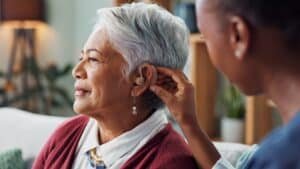8 Best Travel Podcasts for Women Over 50

Do you enjoy listening to podcasts? Do you enjoy traveling? Exploring the world through travel podcasts is an excellent way to gather inspiration, tips, and stories from fellow adventurers.
Here are some of the best travel podcasts to tune into:
- Women Who Travel – This podcast features interviews with influential women in the travel industry, sharing their journeys, tips, and stories from around the globe.
- The Travel Diaries – This podcast brings you conversations with famous guests sharing their travel stories and tips.
- The Globetrotter Lounge – Features interviews with women who have found creative ways to travel more.
- She Explores – focuses on the outdoor adventures and travel experiences of women.
Keep reading to discover more travel podcasts by women travelers.
Travel Podcasts for Women
Whether you’re planning your next trip, dreaming of far-off places, or seeking advice on navigating the travel world, these podcasts offer a wealth of knowledge and inspiration.
Tune in, get inspired, and start planning your next adventure today!
Women Who Travel
Produced by Condé Nast Traveler, “Women Who Travel” is hosted by Lale Arikoglu and Meredith Carey. This podcast features interviews with influential women in the travel industry, sharing their journeys, tips, and stories from around the globe.
Perfect for: Women looking for inspiring stories and practical travel advice from industry experts.
The Travel Diaries
Hosted by travel journalist Holly Rubenstein, “The Travel Diaries” brings you conversations with famous guests sharing their travel stories and tips. From dream destinations to travel mishaps, this podcast covers it all.
Perfect for: Those who enjoy celebrity travel stories and discovering new travel destinations.
The Globetrotter Lounge
Lisette Austin, aka Jet Set Lisette, hosts “The Globetrotter Lounge,” featuring interviews with women who have found creative ways to travel more. From budget travel hacks to solo adventures, this podcast offers valuable insights.
Perfect for: Women seeking practical tips on how to travel more frequently without breaking the bank.
A Broad Abroad
Hosted by travel journalist Erin Van Rheenen, “A Broad Abroad” dives into the stories of women who have moved or traveled abroad. The podcast covers the challenges and triumphs of living and exploring in new countries.
Perfect for: Women contemplating or living the expatriate lifestyle.
The Wander Woman Podcast
Join host Phoebe Smith as she takes you on audio adventures around the world. “The Wander Woman Podcast” combines storytelling with travel tips, focusing on solo female travel experiences.
Perfect for: Solo travelers looking for inspiration and practical advice.
The Solo Travel Woman Podcast
Hosted by Sara, “The Solo Travel Woman Podcast” empowers women to embrace solo travel. The podcast covers a range of topics from safety tips to destination guides, all aimed at encouraging women to explore independently.
Perfect for: Women eager to go on solo travel adventures with confidence.
The Thoughtful Travel Podcast
Hosted by Amanda Kendle, “The Thoughtful Travel Podcast” dives into the personal and profound aspects of travel. Amanda and her guests discuss meaningful travel experiences, cultural insights, and the transformative power of exploring the world.
Perfect for: Women who appreciate deep, reflective conversations about travel and its impact on our lives.
Postcard Academy
Hosted by Sarah Mikutel, “Postcard Academy” focuses on helping women live abroad and travel smarter. Sarah interviews a variety of guests who share practical advice, inspiring stories, and tips for navigating life and travel in foreign countries.
Perfect for: Women considering living abroad or looking for smart travel tips and inspiration.
Tips for Getting the Most Out of Travel Podcasts
Listening to travel podcasts can be both entertaining and educational, but to truly benefit from them, consider these tips:
Create a Playlist
Curate a playlist of your favorite episodes or podcasts for easy access during commutes, workouts, or downtime. This ensures you always have travel inspiration at your fingertips.
Take Notes
Keep a travel journal or digital note-taking app handy to jot down valuable tips, destinations, or contacts mentioned in the episodes. This will help you remember important details when planning your trips.
Engage with the Community
Many travel podcasts have accompanying social media pages or online communities. Join these groups to connect with like-minded travelers, ask questions, and share your experiences.
Follow Up with Research
Use the insights gained from podcasts as a starting point for your research. Look up recommended destinations, accommodations, and activities to get a comprehensive understanding before making any travel plans.
Share with Friends
If you come across an episode that resonates with you, share it with friends or family members who might also enjoy it. This can spark discussions and even lead to collaborative travel planning.
Support the Creators
Many podcasters offer additional content, merchandise, or opportunities for listener support. Consider contributing to your favorite podcasts to help them continue producing quality content.
Read 9 PODCASTS FOR WOMEN OVER 50 to discover a few more amazing podcasts and learn about the top platforms where to listen to them.
Let’s Have a Conversation:
Do you listen to travel podcasts? Which ones are your favorites? Share your thoughts with the community in the comments section below.
Read More









